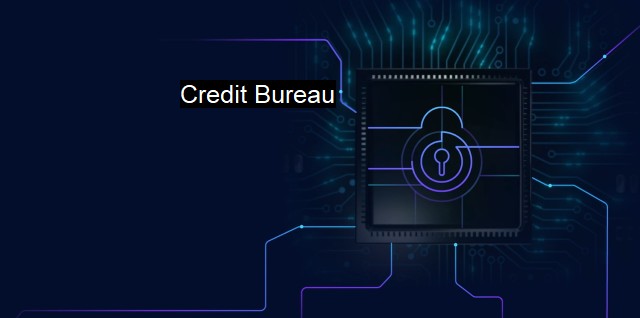What is Credit Bureau?
The Crucial Role of Credit Bureaus in Providing Data for Lending Decisions and Their Role in Protecting Cyber Security From Digital Threats
A credit bureau, also known as a credit reporting agency, is an organization that collects information regarding the credit history of individuals and sells it to creditors so they can make decisions on offering loans or other credit activities. Understanding the role of credit bureaus in the context of cybersecurity and antivirus applications involves exploring the threats they face and the measures they adopt to safeguard their data.Given the wealth and variety of personal financial information stored by credit bureaus, these organizations have become prime targets for cybercriminals. Consequently, cybersecurity, especially with the application of antivirus software, is critical in protecting the sensitive data that credit bureaus hold.
Cybersecurity refers to the body of technologies, processes, and practices designed to safeguard networks, computer systems, and data from digital attacks or unauthorized access. Cybersecurity strategies for credit bureaus incorporate a blend of various approaches that safeguard software, hardware, and data from digital threats.
Antivirus software is pivotal in the cybersecurity strategy of credit bureaus. It is designed to prevent, search for, detect, and remove software viruses and other malicious software. Entities such as credit bureaus can't afford any breach that could result in identity theft or financial loss. Hence, they rely heavily on robust antivirus policies to guard against any threats.
In the modern digital era, credit bureau cybersecurity extends beyond combating typical computer viruses to provide protection against a broad spectrum of potential threats. This includes protecting privacy and holding off breaches that could spill over the personal information of millions of credit holders.
Various attacks, such as phishing attacks, Distributed Denial of Service (DDoS), viruses, spyware, and malware, present real threats to credit bureaus. Therefore, reactive and proactive monitoring and protection against such cyber threats are the hallmark of cybersecurity in credit bureaus. To safeguard against these threats, credit bureaus would call on antivirus software to act essentially as a guard. The antivirus scans computers for signs of malware or other threats, warning users when it detects potentially harmful content.
Because a significant part of stopping threats is detecting them quickly, credit bureaus invest greatly in state-of-the-art detection systems. Modern antivirus frameworks, for instance, use heuristic analysis to evaluate new files for suspicious behavior that could signal malware. many antivirus programs now use machine learning to improve heuristic analysis, with the ability to analyze millions or billions of files daily.
A prime example of the necessity of cybersecurity in this space was the Equifax data breach in 2017. Personal information on 147 million people was exposed in the incident, highlighting the extreme damage potential of unauthorized access for credit bureaus.
It is essential that credit bureaus integrate advanced AI solutions, proper firewalls, and most importantly, maintain robust antivirus systems that constantly update and adapt to new cyber threats. Employing regular external network security audits can aid in identifying vulnerabilities within their systems.
Credit bureaus hold significant amounts of sensitive personal and financial data which are tempting targets for cybercriminals. Ensuring security against cyber threats requires robust cybersecurity measures with emphasis on effective antivirus software. These organizations must continually update their security protocols to steer clear of ever-evolving cyber threats in order to protect sensitive information and maintain trust with their clientele. Cybersecurity is not an option for credit bureaus; it's an imperative engrained in their operations to prevent significant incidents and ensure their own survival.

Credit Bureau FAQs
What is a credit bureau?
A credit bureau is an organization that collects and maintains consumer credit information. They gather data from various sources, such as lenders, creditors, and public records to create credit reports.How do credit bureaus ensure the security of consumer information?
Credit bureaus have robust security measures in place to protect the data they collect. They use encryption, firewalls, and other safeguards to prevent unauthorized access to their systems. They also have strict security policies and procedures in place that all employees must follow.What should I do if I suspect fraudulent activity on my credit report?
If you believe there is fraudulent activity on your credit report, you should contact the credit bureau immediately. They will investigate the issue and take appropriate action. You should also place a fraud alert on your account and monitor your credit report regularly for any unusual activity.Can I request a free copy of my credit report?
Yes, you are entitled to a free copy of your credit report every 12 months from each of the three major credit bureaus - Equifax, Experian, and TransUnion. You can request a copy of your report online, by phone, or by mail. It's important to review your credit report regularly to ensure that all the information is accurate and up-to-date.| | A | | | B | | | C | | | D | | | E | | | F | | | G | | | H | | | I | | | J | | | K | | | L | | | M | |
| | N | | | O | | | P | | | Q | | | R | | | S | | | T | | | U | | | V | | | W | | | X | | | Y | | | Z | |
| | 1 | | | 2 | | | 3 | | | 4 | | | 7 | | | 8 | | |||||||